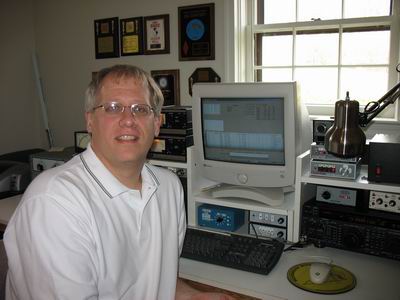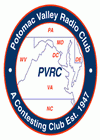 I got my start in
Amateur Radio in 1977 while a freshman in high school.
I got my start in
Amateur Radio in 1977 while a freshman in high school.
I was one of those that got swept up in the CB radio craze. I managed to work Mexico and Argentina on SSB but if memory serves me, working DX on the CB bands was illegal at the time. Either way, the mold was cast!
One evening my dad took me to visit a friend of his, Rich Dykstra WA9LEK. Not that I needed the additional motivation, but I was hooked at that point. Shortly afterwards I ran into Lyle Ten Pas WB9QCY (now WE9R). Lyle helped me get started in a novice class taught by the Sheboygan County (Wisconsin) Amateur Radio Club. Months later I was licensed as WD9DEE. It wasn’t long before I upgraded and became actively involved in chasing DX and contesting from the black hole. Once I got my extra ticket, I applied for a new call and received KE9A.
In August of 1984 I accepted a position with the Diplomatic Telecommunications Service and moved to Virginia. Three months after coming on board, I was offered the chance to go on a 6-week trip to Africa. I spent the first 4 weeks in Liberia and obtained the call EL2CD. During that time I put up a 160-meter antenna, one of my other loves, and managed to work a grand total of 3 people. The first QSO was with John G3PQA. Four days later I managed to work CT1AOZ and VE1YX. My travels during that time also took me to Ivory Coast, Zaire, Cameroon, and Kenya although I did not operate from any of those locations. I did operate from Ivory Coast on another trip in 1998 (TU/K4ZW). As that trip was concluding, the US Embassies in Kenya and Tanzania were blown up. That was enough to convince me it was time to head home.
In 1988 I applied for an overseas assignment and was given the choice of Liberia or the Philippines (Clark Air Base). Liberia would have been a good contest location but Clark was a plum assignment and a little more family friendly so the choice was pretty easy. I spent the next 3 years operating as KE9A/DU3 and working on telecommunications projects at our facility on Clark and at US embassies in the Far East. Life was good! Well for the most part. The Philippines has a lot to offer but unfortunately, we missed out on much of it during the last two years due to the deteriorating security situation. There’s nothing like wearing flack jackets and traveling to Manila in armored vehicles to play the Marines in softball! Our tour concluded a week and a half before the eruption of Mount Pinatubo. During our tour we also experienced a coup attempt and a 7.2 earthquake.
In 1998 I was ready for a change so I went back into the private sector working for Global One (joint venture of Sprint, Deutsche Telecom, & France Telecom). Eventually the venture dissolved. France Telecom took over whole ownership and merged us with another telecom firm, Equant. While I had a great career going there, the new company culture became something I could no longer stomach and by late 2003, it was time to move on. After a short stint with a government-contracting firm, I jumped at an opportunity to move back into government service.
Today I work as an Electrical Engineer, managing projects, for the International Broadcasting Bureau (www.ibb.gov). IBB provides the administrative and engineering support for U.S. government-funded non-military international broadcast services. The most well know of those is Voice of America (www.voa.gov). Our division is responsible for the overseas broadcast infrastructure. My office is located at the Cohen Building in downtown Washington DC, 2 blocks from the US Capital. If you’re ever visiting Washington, drop me an e-mail ([email protected]).
DX CALLS:
WD9DEE/C6A, G/KE9A, KE9A/DU3, KE9A/VS6, EL2CD, 8P9GY, ZF2ZW, TU/K4ZW, JY8ZW, JT1/K4ZW
